| Listing 1 - 10 of 16 | << page >> |
Sort by
|
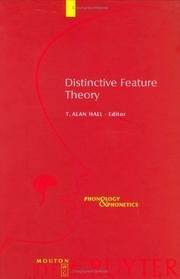
ISBN: 3110170337 3111805964 3110886677 9783110886672 9783110170337 9783110170337 Year: 2001 Volume: 2 Publisher: New York Mouton de Gruyter
Abstract | Keywords | Export | Availability | Bookmark
 Loading...
Loading...Choose an application
- Reference Manager
- EndNote
- RefWorks (Direct export to RefWorks)
This volume consists of nine articles dealing with topics in distinctive feature theory in various typologically diverse languages, including Acehnese, Afrikaans, Basque, Dutch, Finnish, French, German, Hungarian, Japanese, Korean, Navajo, Portuguese, Tahltan, Terena, Tswana, Tuvan, and Zoque. The subjects dealt with in the book include feature geometry, underspecification (in rule-based and in Opti-mality Theoretic treatments) and the phonetic implementation of phonological features. Other topics include laryngeal features (e.g. [voice], [spread glottis], [nasal]), and place features for consonants and vowels. The volume will be of interest to all linguists and advanced students of linguistics working on feature theory and/or the phonetics-phonology interface.
Distinctive features (Linguistics). --- Grammar, Comparative and general --- Phonology. --- Distinctieve kenmerken (Taalwetenschap) --- Distinctive features (Linguistics) --- Traits pertinents (Linguistique) --- Phonology --- Componential analysis (Linguistics) --- Linguistics --- Grammar [Comparative and general ] --- Philology --- Grammar, Comparative and general Phonology
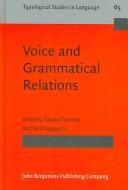
ISBN: 9027229767 9789027229762 9789027293565 9027293562 1282155865 9781282155862 9786612155864 6612155868 Year: 2006 Volume: 65
Abstract | Keywords | Export | Availability | Bookmark
 Loading...
Loading...Choose an application
- Reference Manager
- EndNote
- RefWorks (Direct export to RefWorks)
This volume presents thirteen original papers dealing with various aspects of two related areas of research of major concern to linguists of all theoretical persuasions: voice and grammatical relations. The papers are written from typological, functional, and cognitive perspectives, and contain a number of general studies as well as studies focusing on specific issues, and offer a wealth of data from a broad range of languages. The volume provides up-to-date discussions of an array of issues of theoretical concern, including the nature of grammatical relations, voice in agent/patient systems, the expression vs. non-expression of participant roles, and personal vs. impersonal passives. The papers in the volume demonstrate that investigations into the nature of voice and grammatical relations can still yield fresh theoretical and typological insights.
Grammar, Comparative and general --- Grammatical categories. --- Voice. --- Grammar --- Festschrift - Libri Amicorum --- Voice (Grammar) --- Categories, Grammatical --- Grammatical categories --- Categorization (Linguistics) --- Componential analysis (Linguistics) --- Voice --- Major form classes --- Grammar [Comparative and general ] --- Grammar [Comparative ] --- Linguistics --- Philology
Book
ISBN: 9789027259479 9789027265951 902726595X 902725947X Year: 2017 Volume: 182 Publisher: Amsterdam John Benjamins Publishing Company
Abstract | Keywords | Export | Availability | Bookmark
 Loading...
Loading...Choose an application
- Reference Manager
- EndNote
- RefWorks (Direct export to RefWorks)
This book presents a collection of chapters on the nature, flexibility and acquisition of lexical categories. These long-debated issues are looked at anew by exploring the hypothesis of lexical polycategoriality –according to which lexical forms are not fully, or univocally, specified for lexical category– in a wide number of unrelated languages, and within different theoretical and methodological perspectives. Twenty languages are thoroughly analyzed. Apart from French, Arabic and Hebrew, the volume includes mostly understudied languages, spoken in New Guinea, Australia, New Caledonia, Amazonia, Meso- and North America. Resulting from a long-standing collaboration between leading international experts, this book brings under one cover new data analyses and results on word categories from the linguistic and acquisitional point of view. It will be of the utmost interest to researchers, teachers and graduate students in different fields of linguistics (morpho-syntax, semantics, typology), language acquisition, as well as psycholinguistics, cognition and anthropology.
Linguistic universals. --- Grammar, Comparative and general --- Categories, Grammatical --- Grammatical categories --- Categorization (Linguistics) --- Componential analysis (Linguistics) --- Morphosyntactic features --- Morphosyntax --- Language and languages --- Universals (Linguistics) --- Linguistics --- Typology (Linguistics) --- Morphosyntax. --- Grammatical categories. --- Major form classes --- Morphology --- Syntax --- Universals --- E-books
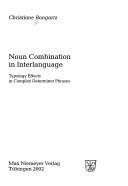
ISBN: 311094071X 9783110940718 3484304480 9783484304482 Year: 2002 Publisher: Tübingen Max Niemeyer Verlag
Abstract | Keywords | Export | Availability | Bookmark
 Loading...
Loading...Choose an application
- Reference Manager
- EndNote
- RefWorks (Direct export to RefWorks)
This monograph examines the effects of first language typology on the interlanguage of learners of English as a second language. Adapting William Rutherford's (1983) view of interlanguage as the typological intersection between the first language and the second language, the study demonstrates how first language effects subtly shape learner choices even at near native proficiency. Grounded in the tradition of transfer research and in the research program in generative grammar, the evidence presented shows the distribution of noun+noun compounds such as the love song and phrasal noun combinations such as the song about love in interlanguage data. These two patterns, it is argued, are systematically related by determiner properties and the process of noun incorporation. Obtained from a multi-task cross-sectional experiment, the data illustrates that learners with Czech as their first language use phrasal constructs (the song about love) significantly more often in production than learners with Mandarin Chinese as their first language, whose preferred choice are noun+noun compounds (the love song). The differences between the learner groups reflect the use of overt case marking in the first language Czech and the absence of overt case marking in the first language Mandarin Chinese.
English language --- Grammar, Comparative and general --- Categories, Grammatical --- Grammatical categories --- Categorization (Linguistics) --- Componential analysis (Linguistics) --- Noun. --- Grammatical categories. --- Major form classes --- Nominals --- Noun --- Second language acquisition --- Linguistics --- Philology --- Germanic languages
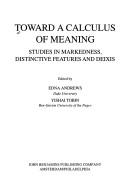
ISBN: 9027215529 1556192681 9027282382 1283234262 9786613234261 9789027282385 9781556192685 9789027215529 Year: 1996 Volume: 43 Publisher: Amsterdam Philadelphia J. Benjamins Pub.
Abstract | Keywords | Export | Availability | Bookmark
 Loading...
Loading...Choose an application
- Reference Manager
- EndNote
- RefWorks (Direct export to RefWorks)
This volume contains papers presented at a symposium in honor of Cornelis H. van Schooneveld and invited papers on the topics of invariance, markedness, distinctive feature theory and deixis. It is not a Festschrift in the usual sense of the word, but more of a collection of articles which represent a very specific way of defining and viewing language and linguistics. The specific approach presented in this volume has its origins and inspirations in the theoretical and methodological paradigm of European Structuralism in general, and the sign-oriented legacy of Ferdinand de Saussure and Charle
Grammar --- Distinctieve kenmerken (Taalwetenschap) --- Distinctive features (Linguistics) --- Gemarkeerdheidstheorie (Taalwetenschap) --- Markedness (Linguistics) --- Marques [Théorie des ] (Linguistique) --- Semantics --- Semantiek --- Sémantique --- Sémasiologie --- Traits pertinents (Linguistique) --- Grammar [Comparative and general ] --- Deixis --- Grammar, Comparative and general --- Semantics. --- Linguistics --- Philology --- Componential analysis (Linguistics) --- Marked member (Linguistics) --- Generative grammar --- Formal semantics --- Semasiology --- Semiology (Semantics) --- Comparative linguistics --- Information theory --- Language and languages --- Lexicology --- Meaning (Psychology) --- Deixis. --- Phonology
Book
ISBN: 3484303662 3110959976 Year: 1997 Volume: 366 Publisher: Tübingen Max Niemeyer Verlag
Abstract | Keywords | Export | Availability | Bookmark
 Loading...
Loading...Choose an application
- Reference Manager
- EndNote
- RefWorks (Direct export to RefWorks)
Dieser Sammelband enthält eine Auswahl der Beiträge, die 1994 auf einem Workshop zur Distinktion lexikalischer Kategorien gehalten wurden. Die verschiedenen theoretischen Richtungen zuzuordnenden Arbeiten befassen sich mit allgemeinen Problemen der Kategorisierung sowie mit Fragen, die sich speziell für bestimmte lexikalische Kategorien (Nomina, Verben, Präpositionen, Konjunktionen) insbesondere in Abgrenzung zu funktionalen Kategorien ergeben. The volume contains a selection of papers given at a workshop organized in 1994 on major lexical categories. The seven articles in this volume take a variety of viewpoints concerning problems of distinguishing major categories in general, as well as problems in connection with specific categories, namely nouns, verbs, prepositions, and conjunctions.
Lexicology. Semantics --- Grammar, Comparative and general --- Semantics --- Formal semantics --- Semasiology --- Semiology (Semantics) --- Comparative linguistics --- Information theory --- Language and languages --- Lexicology --- Meaning (Psychology) --- Categories, Grammatical --- Grammatical categories --- Categorization (Linguistics) --- Componential analysis (Linguistics) --- Major form classes --- Grammar [Comparative and general ] --- Congresses --- German language --- English language --- Philology & Linguistics --- Languages & Literatures --- Semantics. --- Linguistics --- Philology --- Grammatical categories.
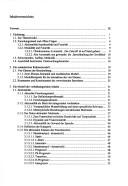
ISBN: 348430409X 3110924838 Year: 1999 Volume: 409 Publisher: Tübinger Max Niemeyer Verlag
Abstract | Keywords | Export | Availability | Bookmark
 Loading...
Loading...Choose an application
- Reference Manager
- EndNote
- RefWorks (Direct export to RefWorks)
French language --- Grammar --- -Grammar, Comparative and general --- -Comparative grammar --- Grammar, Philosophical --- Grammar, Universal --- Language and languages --- Philosophical grammar --- Linguistics --- Philology --- Langue d'oïl --- Romance languages --- Tense --- Grammatical categories --- Verb --- Grammar, Comparative --- Grammar, Comparative and general --- Tense. --- Grammatical categories. --- Verb. --- -Tense --- Categories, Grammatical --- Categorization (Linguistics) --- Componential analysis (Linguistics) --- Verb phrase --- Verbals --- Reflexives --- Major form classes
Book
ISBN: 9789027228161 9027228167 9789027269249 9027269246 1322490333 Year: 2014 Volume: 6 Publisher: Amsterdam ; Philadelphia, PA John Benjamins Publishing Company
Abstract | Keywords | Export | Availability | Bookmark
 Loading...
Loading...Choose an application
- Reference Manager
- EndNote
- RefWorks (Direct export to RefWorks)
This paper focuses on oblique variation in the passive. It relies on insights on causal modeling to study the construction types available to express a passive or medio-passive meaning in Spanish. Oblique variation is argued to fulfill an important function in the profiling of the relation between agent and patient, causer and causee, affectant and affectee. The choice of the preposition is shown to function as a device for agenthood management. Based on distributional evidence, the systematic survey of representative corpus examples with the four most frequent prepositions (por 'by, through',
Grammar --- Grammar, Comparative and general --- Grammatica. --- Naamvallen. --- Case. --- Word order. --- Grammatical catagories. --- Morphology. --- Semiotics. --- Structural linguistics. --- Languages & Literatures --- Philology & Linguistics --- Case --- Word order --- Grammatical catagories --- Comparative grammar --- Grammar, Philosophical --- Grammar, Universal --- Language and languages --- Philosophical grammar --- Grammar, Comparative --- Linguistics --- Philology --- Order (Grammar) --- Grammatical categories. --- Categories, Grammatical --- Grammatical categories --- Categorization (Linguistics) --- Componential analysis (Linguistics) --- Major form classes
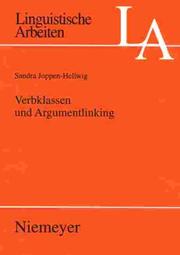
ISBN: 3484304421 3110915111 Year: 2001 Volume: 442 Publisher: Tübingen Niemeyer
Abstract | Keywords | Export | Availability | Bookmark
 Loading...
Loading...Choose an application
- Reference Manager
- EndNote
- RefWorks (Direct export to RefWorks)
In dieser Monographie werden die Verbklassen und Argumentrealisierung in Sprachen mit jeweils drei strukturellen Linkern (Kasus oder Kongruenz) untersucht. Die behandelten Sprachen gehören unterschiedlichen Sprachtypen an: Deutsch verfügt über ein Akkusativsystem, Baskisch über ein Ergativsystem und Georgisch über ein Splitsystem. Neben kanonischen Verbklassen, d.h. intransitiven, mono- und ditransitiven Verben, werden vor allem Verben mit expletiven Argumenten behandelt, Verben mit nicht-kanonischen Argumenten, wie etwa zweistellige Verben mit Dativargument (z.B. helfen oder folgen), und Verben, die mehr Argumente aufweisen als strukturelle Linker zur Verfügung stehen, wie etwa vierstellige Kausativa. Die Untersuchungen zeigen, daß sich die Sprachtypen nicht nur hinsichtlich der Verwendung von Akkusativ versus Ergativ auf charakteristische Weise unterscheiden, sondern auch hinsichtlich der Realisierung von Expletiva, nicht-kanonischen Argumenten und vierstelligen Verben.
Grammar, Comparative and general --- Typology (Linguistics) --- Grammatical categories. --- Verb phrase. --- Typology (Linguistics). --- Categories, Grammatical --- Grammatical categories --- Categorization (Linguistics) --- Componential analysis (Linguistics) --- Language and languages --- Linguistic typology --- Linguistics --- Linguistic universals --- Predicate (Grammar) --- Verb phrase --- Major form classes --- Typology --- Classification --- Phrasal verb --- Predicate --- Verbals --- Grammar [Comparative and general ] --- Verb --- Topic and comment --- Philology
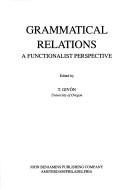
ISBN: 1283315785 9786613315786 9027275785 9789027275783 1556196466 9027229317 9789027229311 1556196458 9781556196454 9781556196461 9027229325 9789027229328 Year: 1997 Volume: 35 Publisher: Amsterdam ; Philadelphia John Benjamins publishing company
Abstract | Keywords | Export | Availability | Bookmark
 Loading...
Loading...Choose an application
- Reference Manager
- EndNote
- RefWorks (Direct export to RefWorks)
This volume presents a functional perspective on grammatical relations (GRs) without neglecting their structural correlates. Ever since the 1970's, the discussion of RGs by functionally-oriented linguists has focused primarily on their functional aspects, such as reference, cognitive accessibility and discourse topicality. With some exceptions, functionalists have thus ceded the discussion of the structural correlates of GRs to various formal schools. Ever since Edward Keenan's pioneering work on subject properties (1975, 1976), it has been apparent that subjecthood and objecthood can only
Grammar, Comparative and general --- Functionalism (Linguistics) --- Functional analysis (Linguistics) --- Functional grammar --- Functional linguistics --- Functional-structural analysis (Linguistics) --- Grammar, Functional --- Grammatical functions --- Linguistics --- Structural linguistics --- Grammaticalization --- Semantics --- Categories, Grammatical --- Grammatical categories --- Categorization (Linguistics) --- Componential analysis (Linguistics) --- Grammatical categories. --- Grammaticalization. --- Syntax --- Major form classes --- Catégories grammaticales --- Grammaticalisation --- Fonctionnalisme (Linguistique) --- Grammar --- Grammar [Comparative and general ] --- Philology
| Listing 1 - 10 of 16 | << page >> |
Sort by
|

 Search
Search Feedback
Feedback About UniCat
About UniCat  Help
Help News
News